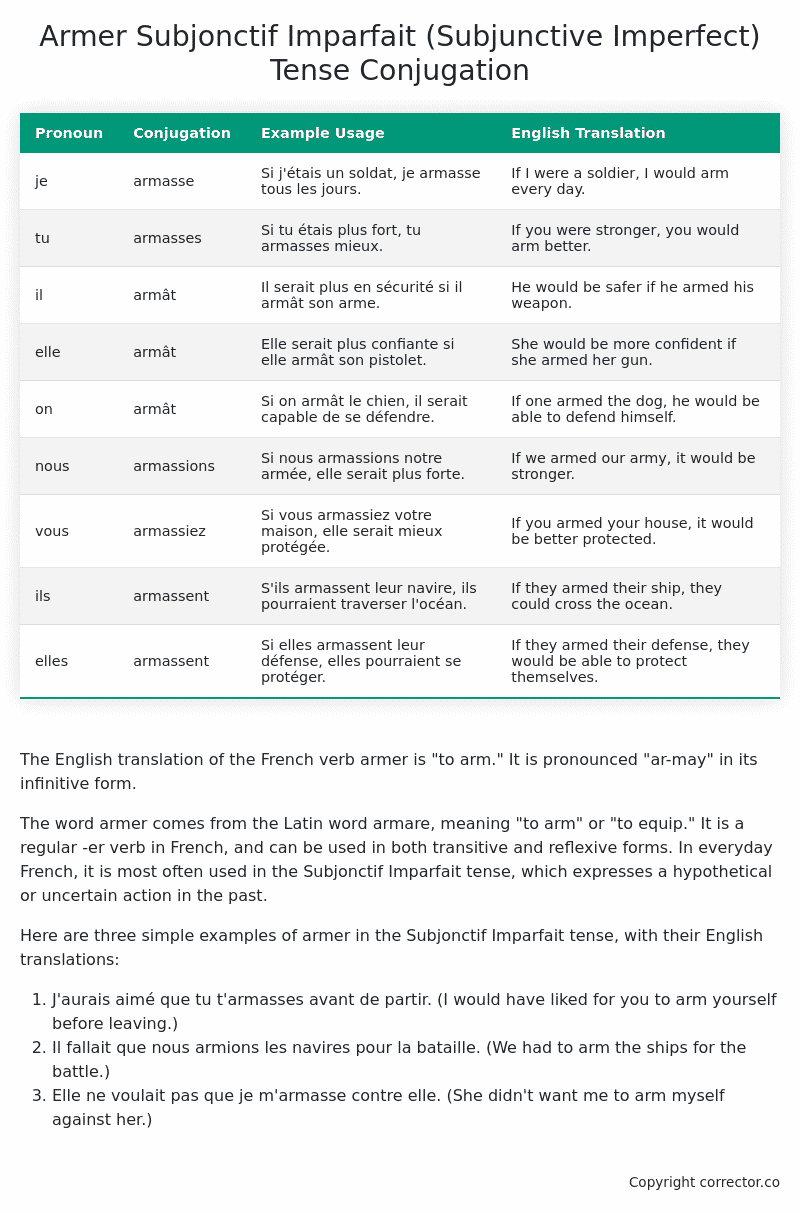Subjonctif Imparfait (Subjunctive Imperfect) Tense Conjugation of the French Verb armer
Introduction to the verb armer
The English translation of the French verb armer is “to arm.” It is pronounced “ar-may” in its infinitive form.
The word armer comes from the Latin word armare, meaning “to arm” or “to equip.” It is a regular -er verb in French, and can be used in both transitive and reflexive forms. In everyday French, it is most often used in the Subjonctif Imparfait tense, which expresses a hypothetical or uncertain action in the past.
Here are three simple examples of armer in the Subjonctif Imparfait tense, with their English translations:
- J’aurais aimé que tu t’armasses avant de partir. (I would have liked for you to arm yourself before leaving.)
- Il fallait que nous armions les navires pour la bataille. (We had to arm the ships for the battle.)
- Elle ne voulait pas que je m’armasse contre elle. (She didn’t want me to arm myself against her.)
Table of the Subjonctif Imparfait (Subjunctive Imperfect) Tense Conjugation of armer
| Pronoun | Conjugation | Example Usage | English Translation |
|---|---|---|---|
| je | armasse | Si j’étais un soldat, je armasse tous les jours. | If I were a soldier, I would arm every day. |
| tu | armasses | Si tu étais plus fort, tu armasses mieux. | If you were stronger, you would arm better. |
| il | armât | Il serait plus en sécurité si il armât son arme. | He would be safer if he armed his weapon. |
| elle | armât | Elle serait plus confiante si elle armât son pistolet. | She would be more confident if she armed her gun. |
| on | armât | Si on armât le chien, il serait capable de se défendre. | If one armed the dog, he would be able to defend himself. |
| nous | armassions | Si nous armassions notre armée, elle serait plus forte. | If we armed our army, it would be stronger. |
| vous | armassiez | Si vous armassiez votre maison, elle serait mieux protégée. | If you armed your house, it would be better protected. |
| ils | armassent | S’ils armassent leur navire, ils pourraient traverser l’océan. | If they armed their ship, they could cross the ocean. |
| elles | armassent | Si elles armassent leur défense, elles pourraient se protéger. | If they armed their defense, they would be able to protect themselves. |
Other Conjugations for Armer.
Le Present (Present Tense) Conjugation of the French Verb armer
Imparfait (Imperfect) Tense Conjugation of the French Verb armer
Passé Simple (Simple Past) Tense Conjugation of the French Verb armer
Passé Composé (Present Perfect) Tense Conjugation of the French Verb armer
Futur Simple (Simple Future) Tense Conjugation of the French Verb armer
Futur Proche (Near Future) Tense Conjugation of the French Verb armer
Plus-que-parfait (Pluperfect) Tense Conjugation of the French Verb armer
Passé Antérieur (Past Anterior) Tense Conjugation of the French Verb armer
Futur Antérieur (Future Anterior) Tense Conjugation of the French Verb armer
Subjonctif Présent (Subjunctive Present) Tense Conjugation of the French Verb armer
Subjonctif Passé (Subjunctive Past) Tense Conjugation of the French Verb armer
Subjonctif Imparfait (Subjunctive Imperfect) Tense Conjugation of the French Verb armer (this article)
Subjonctif Plus-que-parfait (Subjunctive Pluperfect) Tense Conjugation of the French Verb armer
Conditionnel Présent (Conditional Present) Tense Conjugation of the French Verb armer
Conditionnel Passé (Conditional Past) Tense Conjugation of the French Verb armer
L’impératif Présent (Imperative Present) Tense Conjugation of the French Verb armer
L’infinitif Présent (Infinitive Present) Tense Conjugation of the French Verb armer
Struggling with French verbs or the language in general? Why not use our free French Grammar Checker – no registration required!
Get a FREE Download Study Sheet of this Conjugation 🔥
Simply right click the image below, click “save image” and get your free reference for the armer Subjonctif Imparfait tense conjugation!

Armer – About the French Subjonctif Imparfait (Subjunctive Imperfect) Tense
Formation
Common Everyday Usage Patterns
Interactions with Other Tenses
Subjonctif Présent
Indicatif Passé Composé
Conditional
Conditional Perfect
Summary
I hope you enjoyed this article on the verb armer. Still in a learning mood? Check out another TOTALLY random French verb conjugation!


